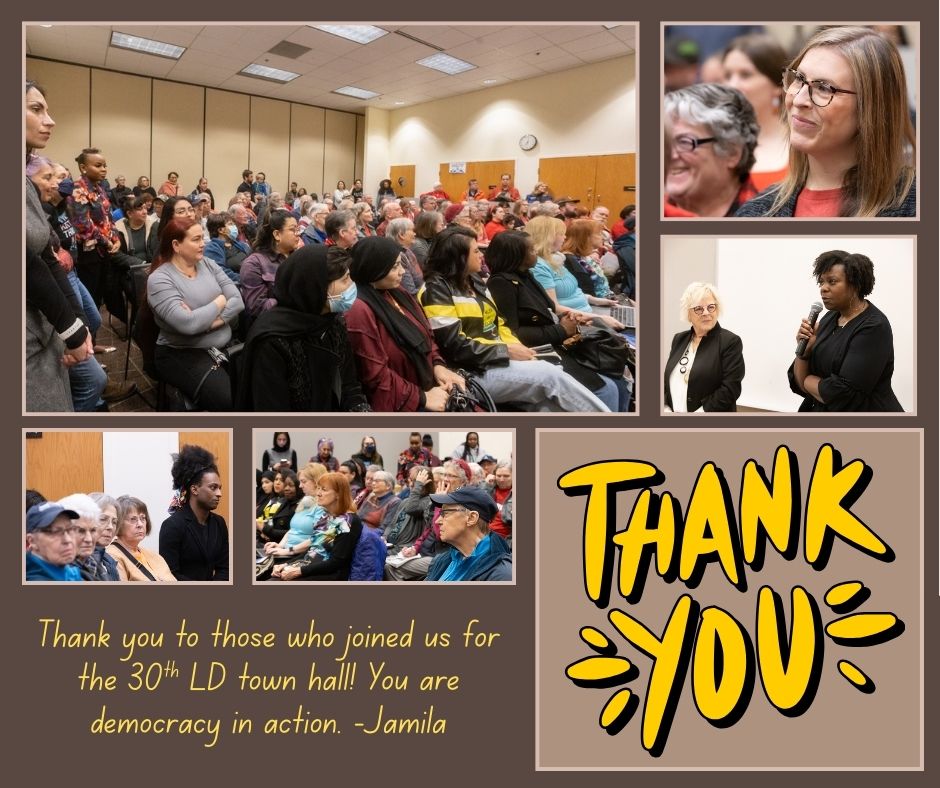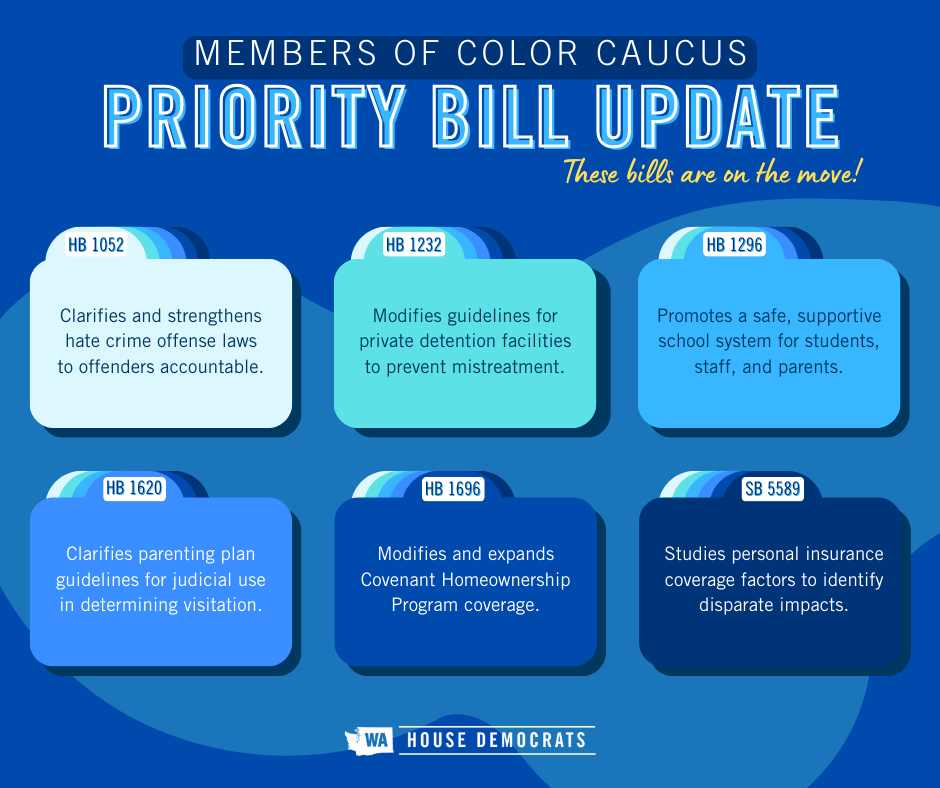
Dear friends and neighbors,
First of all, thank you to the many folks who stopped by the 30th Legislative District town hall in Federal Way last weekend. All across the state legislators have been seeing record turnouts at in-person and telephone town halls in their districts, and our event was no exception. It was packed! You can check out photos from the event on my Facebook page.
There were so many great questions around what we’re doing to address our state budget deficit, how we’re going to keep funding education, and what solutions we’re looking at to address affordable housing. Read on to see a few of the questions we received during the town hall!
Many of the folks who attended were curious about revenue proposals and how we’re going to balance the budget. Want to weigh in? Take the survey to share your thoughts on the 2025-27 state budget proposal.
Public Safety

When crime rates rise for any reason, folks face growing fear about personal safety and property safety rise. I experience that heightened anxiety just like you do.
Every person should be able to feel safe living in and interacting with their community: you, me, our neighbors down the street and our friends across town. How we get to that point is complicated because public safety includes things like police protection and fire and aid response, but it also is influenced by things like mental and behavioral health treatment access, access to firearms, and a functioning judicial system.
Regional police academies
One of the ways to reduce the racism embedded in our institutions and systems is to make sure the people who serve the community are representative of the community. Establishing more police training academies around the state will make it easier for folks from all across the state to apply for and train in that profession.
State vs. Local jurisdiction
It can be tough to keep track of what falls under state versus local jurisdiction, especially when it comes to enforcement and criminal activity. However, local laws can address things like where and when police officers patrol and how local jails are managed. Hyper-local policing decisions are left to local elected officials to decide, but once an issue becomes more widespread, it can rise to the state level.
One great example of this is catalytic converter theft. People across the state were getting vandalized, but thanks to bills passed in the legislature, catalytic converter theft has declined. Rep. Cindy Ryu passed ESHB 2153 during the 2024 legislative session which provides even more protection from theft and is set to go into effect on April 1.
✅ Strengthening laws against hate crimes (HB 1052) will ensure that these laws can be enforced and those who target another individual because of their race, color, religion, ancestry, national origin, gender, sexual orientation, gender expression or identity, or disability, is held accountable for the harm they case.
✅ Modifying how sexually violent predators are tried in court (HB 1180) will enhance protections for communities and improve public safety by ensuring information provided to the court is sound and that the highest risk individuals are getting treatment before they are released.
Prioritizing students and education through progressive revenue

The short answer is unequivocally funding education is the highest priority. The longer answer is that we have a $12 billion budget gap that can’t be closed with just new revenue or just cuts. It’s going to have to a mixture of both. House Democrats are looking at ways we can grow revenue through asking the wealthy to pay their fair share while also combing the budget for ways we can scale back spending without hurting folks who depend on crucial services. With that said, funding education isn’t up for debate in the legislature. It’s the paramount duty of the state and we stand behind that commitment.

By focusing on revenue from those who can afford it, we can protect our education funding, including fully funding teacher salaries, school meals, and special education, while keeping college tuition stable so higher education remains within reach.
Here’s a few of the progressive revenue policies that are currently being considered:
✅ A Financial Intangible Assets Tax (FIT) – This applies a tax on stocks and bonds owned by ultra-wealthy individuals (exempting the first $50 million) to generate $2 billion per year for K-12 education. Homeowners already pay property taxes on their biggest asset—their home. This ensures that those whose wealth comes from financial assets contribute their fair share, too.
✅ School & Public Safety Funding Adjustments – Our proposal allows property tax growth to reflect inflation and population increases (capped at 3%) and ensures rural school districts receive fair funding. This brings in $50 million in 2026 and $150 million in 2027 for K-12 schools.
✅ Surcharge on High-Grossing Corporations – We’re asking the biggest corporations and financial institutions—those making over $250 million a year—to pay a modest surcharge, generating nearly $2 billion by 2027. Small businesses won’t be affected, but this will help protect public services that working families rely on.
I want to know what you think. Weigh in on these proposals by taking this survey.
Housing

We’ve seen rents skyrocket and home prices soar out of reach in Washington, making many folks feel like they may never have a chance at homeownership. An unexpected rent increase for many families carries a risk of having to choose between putting food on the table and paying rent or even becoming unhoused. That’s a terrifying prospect for anyone to face, and for parents trying to keep a roof over their kids’ head, that choice can be agonizing and heartbreaking.
Here are a few bills that we’re working on to increase the housing supply, protect middle- and low-income renters, and bring the dream of homeownership to more folks in Washington.
✅ Rent stabilization (HB 1217) would cap rent increases at 7% a year, making housing costs more predictable for renters while allowing landlords to keep up with costs.
✅ Covenant Homeownership Program (HB 1696) expands our historic Covenant Homeownership program, helping more people whose families were denied opportunity because of racist restrictions buy their first home.
✅ Simplifying condo construction statutes (HB 1403) increases the supply of affordable housing by making condo development more predictable and potentially less expensive
✅ Finding ways to reduce insurance costs for condo builders (HB 1516) will help bring down home prices for buyers and encourage more development of affordable units that enable more people to become first-time homebuyers.
Federal funding cuts

Federal actions dismantling protections for vulnerable groups and funding cuts for vital services like healthcare and education are causing fear and anxiety across the country, and many of you spoke up about your own worries during the town hall.
While the state cannot pass laws that conflict with federal laws, there are still ways we can strengthen protections for vulnerable groups and prepare for potential cuts to minimize the impact on the people in our state. Here’s a few examples of bills we’re passing to do just that:
✅ Allowing people to use sick leave for immigration proceedings (HB 1875) would give people greater flexibility to attend judicial or administrative immigration proceedings without putting their job at risk.
✅Giving the governor greater jurisdiction over outside militia activities within the state will protect state autonomy by preventing other states from sending their military into WA without the governor’s permission.
Members of Color Caucus priority bills for 2025 update

As your representative and 1st Vice Chair of the Members of Color Caucus, I am committed to ensuring that all voices—especially those of immigrants and refugees—are included in policymaking, especially given what’s happen at a national level. Our budgets and laws must reflect our values of equity and inclusion. Earlier this session the MOCC identified 18 bills that advanced our caucus priorities. Out of the 18, there are 6 that are still alive.
ArtsWA now accepting applications for business grants!

Supporting arts, heritage, and culture organizations is essential to keeping art alive in our communities and ensuring that it can be enjoyed by everyone at every income level. Mid- and large-sized organizations still have time to apply for general operating support grants through ArtsWA! Applications close at 5PM on Monday, April 7 so don’t waste time submitting a request for your organization at: https://www.arts.wa.gov/.
